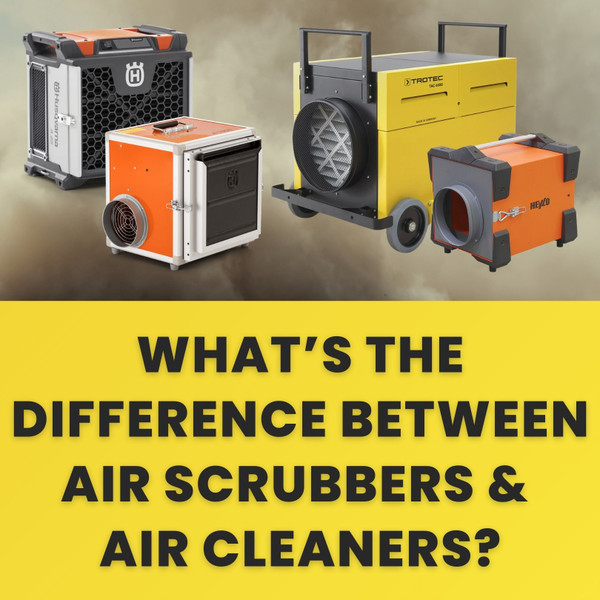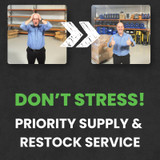Air Cleaners vs Air Scrubbers: What's the Difference?
As we spend over 90% of our time indoors, the importance of clean air cannot be overstated. From homes and offices to construction sites and restoration projects, poor indoor air quality (IAQ) has a significant effect on health problems, safety, and productivity.
But how do we ensure the air we breathe is as clean and safe as possible? Two common solutions exist: air cleaners and air scrubbers. While both are designed to improve air quality, air cleaners come out on top, and here's why.
Air Cleaners: The Superior Solution
The construction of an air cleaner is designed to eliminate air leakage and ensure only clean air is produced. Here’s what makes them exceptional:
- High-Quality Build: Air cleaners feature a robust construction that prevents any air from leaking between the inlet, HEPA filter, and outlet. This ensures that all incoming air is thoroughly filtered.
- Advanced HEPA Filtration: Equipped with H13 or H14 HEPA filters, some of the highest standards available, air cleaners can trap up to 99.995% of harmful particulate matter, including dust particles, airborne particles, mould spores, allergens, and even some viruses.
- Pre-Filters for Maximum Efficiency: Dirty particulates are trapped in pre-filters before reaching the HEPA filter, extending the life of the primary filter and ensuring optimal performance.
- On-the-Job Confirmation: Using a particle counter provides real-time proof that the air cleaner is doing its job. You can measure the particle count before and after air filtration, confirming that the air leaving the machine is significantly cleaner.
When Do You Need an Air Cleaner?
- During Restoration Projects: Flood or fire damage restoration can release dangerous particulates into the air. An air cleaner ensures contaminants are trapped and clean air is circulated.
- Construction Sites: Construction and renovation generate copious amounts of dust and debris from building materials. Air cleaners are crucial to maintain safe air quality for workers and nearby residents.
- Healthcare Environments: Hospitals and clinics require sterile air. Air cleaners with high-grade HEPA filters are essential for reducing airborne pathogens and protecting patient health.
- Home or Office Use: Allergens, pet dander, and indoor pollutants can negatively impact health. Air cleaners provide a safe solution for cleaner, breathable air.
Air Scrubbers: Why They Fall Short
While air scrubbers are commonly used in the industry, they have limitations that make them less effective at delivering truly clean air:
- Subpar Construction: Air scrubbers are often built in a way that allows air to leak between the inlet and outlet, meaning not all particulates are captured. This leakage compromises the effectiveness of the device.
- Lower-Quality Filters: The HEPA filters in air scrubbers may not meet the stringent standards of H13 or H14 filters. This means more harmful particles can escape filtration.
- Less Reliable Air Sealing: The lack of a tight seal between the machine and its filters allows dirty air to bypass the filtration process, reducing the overall air-cleaning efficiency.
Why You Need Air Cleaners on Your Job Sites
With changing air quality regulations and a growing awareness of the health risks posed by indoor air pollution, using air cleaners has become more important than ever. Here’s why:
- Health Protection: Clean air is critical for protecting the health of workers and occupants, especially in environments filled with hazardous particulates.
- Compliance with Regulations: New air management laws demand better air quality measures. Air cleaners can help you stay compliant and avoid penalties.
- Operational Efficiency: Cleaner air reduces the risk of respiratory issues among workers, leading to fewer sick days and higher productivity.
- Versatile Applications: From restoration and construction to healthcare and everyday home use, air cleaners are adaptable and effective across multiple environments.
Best Air Cleaner Benefits
- Effective Particle Removal: Captures even the smallest particle, improving air quality significantly.
- Energy Efficiency: Modern air cleaners are designed to be energy-efficient, saving on operational costs.
- Noise Reduction: Many air cleaners are engineered to run quietly, making them suitable for environments where noise control is important.
- Easy Maintenance: Simple filter replacements and minimal upkeep keep these machines running smoothly.
Questions You Should Be Asking:
- Do I Need an Air Cleaner or an Air Scrubber? If your goal is truly clean air with minimal health risks, an air cleaner is the superior choice.
- How Do I Confirm My Air Cleaner Is Working? Use a particle counter to measure the air quality before and after air filtration. A significant drop in particle count confirms effective operation.
- Are All HEPA Filters the Same? No. Ensure your air cleaner uses H13 or H14 HEPA filters for the highest level of filtration.
- How Often Should Filters Be Replaced? This depends on the usage and environment, but regular maintenance is key to consistent performance.
Investing in an air cleaner over an air scrubber can make a substantial difference in the air quality of your workspace or home. As awareness of indoor air quality continues to grow, choosing the right equipment is crucial. With air cleaners, you’re not just filtering the air—you’re ensuring a cleaner, safer environment for everyone involved.
Recent Posts
-
Start the Year Strong with Our Restocking Service
Because the busiest season is when you need the fewest surprises. The new year is already in full sw …3rd Jan 2026 -
Ten Years of Restore Solutions: Innovation for Restorers
In 2015, Restore Solutions entered the market with one clear purpose — to help restoration professio …2nd Dec 2025 -
The Ultimate Battery Operated Power Scrubber for Restoration Professionals
Less Elbow Grease, More Results: Meet the Battery-Powered Scrubber That Does the Hard Work for You S …17th Nov 2025




